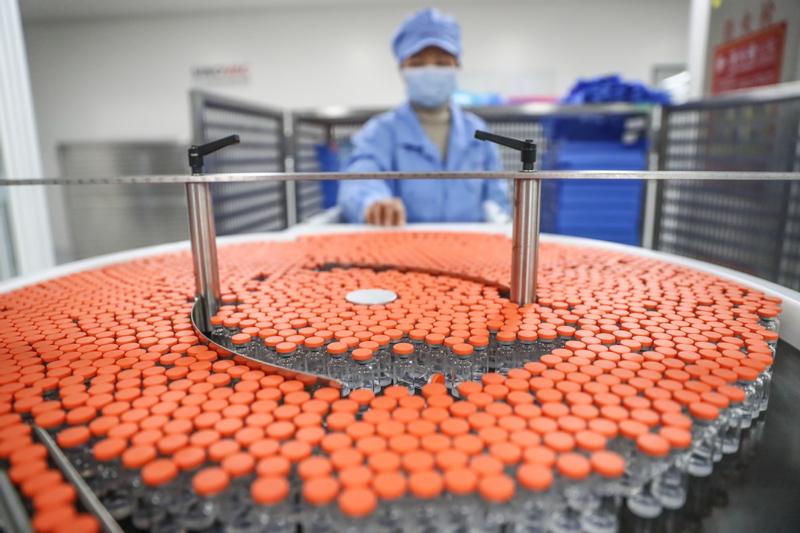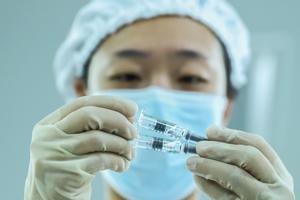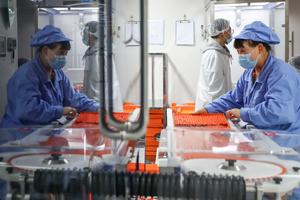 A staff member of Sinovac Biotech manages a vaccine array in the company's workshop. (ZHANG YUWEI / XINHUA)
A staff member of Sinovac Biotech manages a vaccine array in the company's workshop. (ZHANG YUWEI / XINHUA)
With millions getting vaccinated in China to avoid contracting COVID-19, the country's pharmaceutical cold chain logistics sector is set to get a boost, said industry analysts and business executives.
Official data showed the country has 15 vaccine candidates entering clinical trials, with five of them already in third stage clinical tests. A candidate vaccine of China National Pharmaceutical Group (Sinopharm) was conditionally approved for use on Dec 31, a day after the company announced results of its phase 3 study showing the vaccine to be 79 percent effective in preventing COVID-19.
Increasing investment in the sector will help boost the development of the domestic pharmaceutical cold chain industry, said analyst Chen Mengjie, Yuekai Securities
A total of 18 enterprises are expanding or setting up new production lines for COVID-19 vaccines, said the Ministry of Industry and Information Technology. The annual capacity of Sinopharm has already hit 1 billion doses. Sinovac Biotech Ltd's vaccine candidate is now conducting phase 3 human testing, and is expected to finish its capacity expansion project soon to increase annual production capacity to 1 billion doses.
The value of the domestic cold chain logistics market-which handles both foodstuffs and pharmaceuticals-was about 220 billion yuan (US$34 billion) in 2019, and the figure is expected to surge to 1.6 trillion yuan after the deployment of more COVID vaccines, said Zhang Qingsong, head of the logistics arm of Jointown Pharmaceutical Group, China's largest non-State-owned pharmaceutical distribution company.
"Upcoming wide-ranging COVID-19 vaccination drives require strengthened capability in vaccine storage and distribution, and that is set to accelerate the development of the cold chain logistics industry for pharmaceuticals in China," Zhang said.
 An expert inspects vaccines at the workshop of the Beijing Institute of Biological Products affiliated with Sinopharm. (ZHANG YUWEI / XINHUA)
An expert inspects vaccines at the workshop of the Beijing Institute of Biological Products affiliated with Sinopharm. (ZHANG YUWEI / XINHUA)
The large-scale demand for new coronavirus vaccines will accelerate the upgrade of domestic pharmaceutical cold chain logistics featuring enhancements in hardware, human resources, management, quality control and digitalization to further improve the overall performance of the industry-especially in areas such as services quality, response speed and industrial standardization, he said.
After deciding to provide homegrown vaccines free of charge to its citizenry, China has so far administered more than 10 million doses of self-developed COVID-19 vaccines during the ongoing vaccination campaign targeting a number of key groups, including those engaged in handling imported cold-chain products, Customs workers and medical staff, according to the State Council joint prevention and control mechanism against COVID-19. Health authorities and experts estimate that if 70 percent of the country is successfully vaccinated, the spread of the disease from person to person will become unlikely.
In July 2020, several Chinese government departments, including the Ministry of Finance and central health authorities, jointly issued a notice requiring national reinforcement of cold chain investment and infrastructure. Following the notice, many local governments have stepped up efforts to strengthen cold chain capabilities, such as funding cold chain devices related to disease control and setting up various preventive measures.
ALSO READ: Chinese vaccines prepare for rollout as frontliners get the jab
In a recent report by Yuekai Securities, analyst Chen Mengjie said vaccine rollouts will lead to a surge in the pharmaceutical cold chain sector-which is mainly composed of refrigerated production, storage and distribution-thanks to government policy measures that encourage related infrastructure construction.
Increasing investment in the sector will help boost the development of the domestic pharmaceutical cold chain industry, Chen said.
 Workers package vaccines produced by Sinovac Biotech at a company workshop. (ZHANG YUWEI / XINHUA)
Workers package vaccines produced by Sinovac Biotech at a company workshop. (ZHANG YUWEI / XINHUA)
Jointown Pharmaceutical has built 31 provincial-level logistics centers and 104 city-level logistics centers. With a history of 20 years in the pharmaceutical cold chain sector, the company has 455 warehouses with good supply practice certificates, and has a total storage capacity of 105,000 cubic meters.
Its cold chain facilities also include more than 250 refrigerated vehicles, over 1,700 outsourced vehicles and more than 5,000 cold chain incubators.
Due to its recently inked strategic cooperation deal on vaccine storage and transportation with Sinovac Biotech (Hong Kong) Ltd, another subsidiary of Sinovac Biotech Ltd, Jointown has been upgrading current facilities with high standards, and plans to increase its refrigerated vehicles by 50 to 100 for vaccine distribution.
Shanghai Fosun Pharmaceutical Group Co Ltd, which is in a partnership with German biotech company BioNTech SE using a new technology known as messenger RNA to develop COVID-19 vaccines, said it has built cold storage facilities near Shanghai Pudong International Airport ahead of possible deployment of the vaccine on the Chinese mainland. The company has partnered with Sinopharm Group Co Ltd for future distribution of the vaccine, which needs to be kept within cold chain distribution at temperatures of-70 C. At temperatures between 2 C and 8 C, it can be stored for up to five days.
Fosun Pharma announced last month 100 million doses of its BNT162 mRNA-based vaccine candidate would be provided to the Chinese mainland this year, subject to regulatory approval, with initial supplies to be delivered from BioNTech's production facilities in Germany.
READ MORE: Chinese vaccines show effective protection against COVID-19


